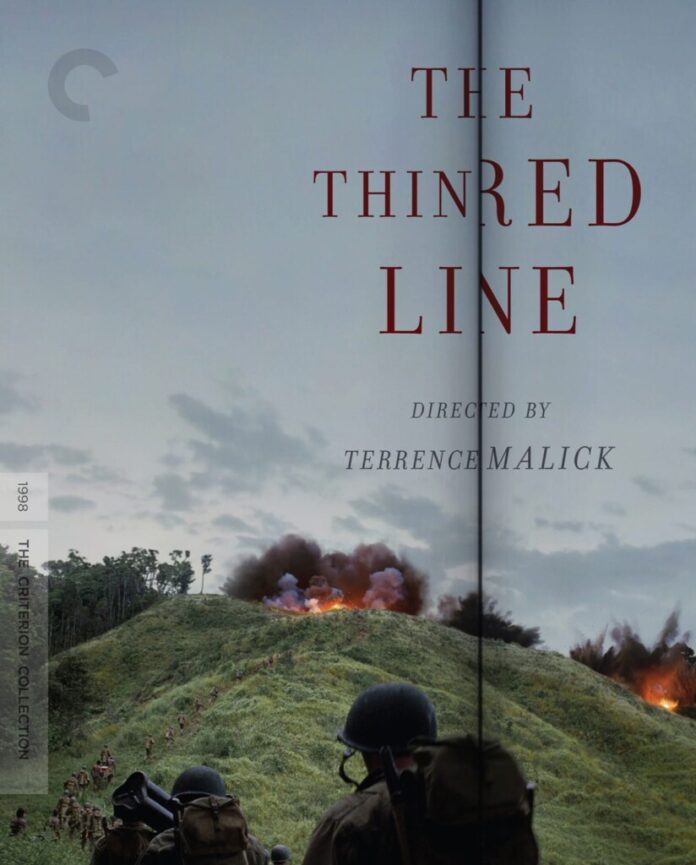“In this world, a man himself is nothing. And there ain’t no world but this one.”
“You’re wrong there top, I’ve seen another world. Sometimes I think it was just my imagination.”
“Well, then you’ve seen things I never will. We’re living in a world that is blowing itself to hell faster than everybody can arrange it… in a situation like that the only thing a man can do is shut his eyes and let nothing touch him… and look out for himself.”
The above dialogue, features two diametrically opposing characters in the 1998 war movie release The Thin Red Line, encapsulates one of the many messages throughout the film. The Thin Red Line, directed by Terrence Malick, undertook a fundamentally unorthodox approach to portraying the consequences of military conflict on its participants, as well as their own interpretations of this calamitous event.
The movie was arrayed with a star-studded cast, including Sean Penn, Adrien Brody, Jim Caviezel, Ben Chaplin, George Clooney, John Cusack, Woody Harrelson, Elias Koteas, Nick Nolte, John C. Reilly, and John Travolta.
What makes A Thin Red Line so alluring compared to most other war movies I’ve watched is the depth it possesses compared to other war films like Saving Private Ryan, All Quiet on the Western Front, and Jarhead. There are multiple character arcs, commentaries on nature and humanity, and conflicting philosophical views to analyze, so a traditional – and linear – discussion of the “theme” of the movie is hard to pin down.
Instead, I’ll go through each separate lesson I personally took away from this film.
Part 1: Is Violence Natural?
The opening scene of The Thin Red Line features a crocodile in the jungle, delving into murky waters, representing nature’s ability to possess means of violence towards other forms of life and to do so in a form that may be unseen by some.
A man – later identified as the character Private Witt (played by Jim Caviezel) – asks the following: “What’s this war at the heart of Nature? Why does Nature vie with itself? Why does the land contend with the sea? Is there an avenging power in nature? Not one, but two?”

The jungle environment switches into shots of Melanesian children on a Pacific island, swimming and playing with each other. The soft hymns of a choir – orchestrated by Hans Zimmer – play overhead, indicating a calm within the community. And the American private Witt, despite being a clear outsider, is at peace with these strangers, who have accepted them into their home.
It’s unclear how – or why – Witt found himself here, but when American soldiers apprehend him and he finds himself being interrogated by a certain Sergeant Welsh (played by Sean Penn), it is revealed Witt deserted the Army to escape to the peaceful Melanesian community.

Witt challenges Welsh’s courage, asserting that “I’m twice the man you are,” implying Witt views his desertion not as cowardice, but as an act of courage. Welsh and Witt then posit their opposing worldviews, as written in the opening of this article. Welsh says that “a man is nothing, and there ain’t no world but this one,” outlining his own embrace of the chaos in the world. Welsh views violence as inherent within nature, and something that cannot be ignored but rather endured.
Witt disagrees, his own experience with the idyllic Melanesians instilled in him a sense of optimism toward the future. Seeing visions of “another world” beyond the current state of violence and death, Witt believes that violence is not natural within humanity and is only something “forced” upon them.
Throughout the film, the gratuitous acts of violence the audience sees are contrasted by idyllic imagery of nature, with dazzling beams of sunlight filtering through the jungle. It’s a perfect contrast between the real and the ideal that the soldiers live through and dream of. However, over time this natural beauty becomes overtaken by man’s conflict with each other, such as when a bird is seen with its wing shot off, vainly attempting to rise and fly again, as the noise of battle plays overhead.
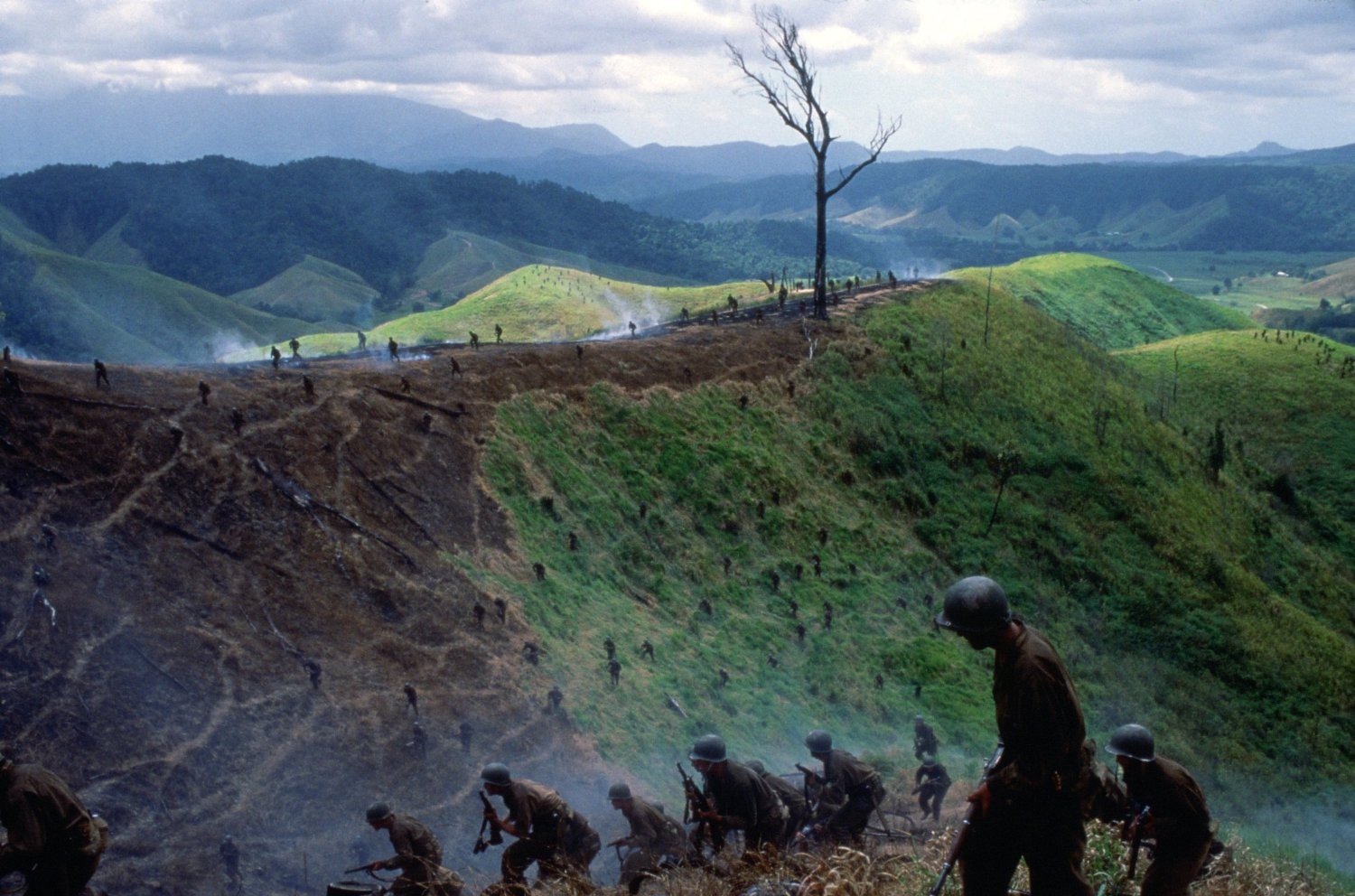
Witt’s blind faith in visions of a future world becomes challenged by the progressively dystopian world he finds himself in, and when he returns to the tranquil Melanesian community he originally loved so much, he finds it to be ravaged with disease and death. The children are malnourished and the adults fight amongst themselves. It appears that Witt’s world no longer exists. Welsh’s nihilism has now become pragmatism, as he embraces the present world he finds himself in and has already hardened himself to his present world.
Part 2: Empathy in Leadership
While Witt and Welsh spar in the brig, American officers discuss battle plans above deck. It is here where we are introduced to Colonel Tall, an aged figure who monologues on his own climb to the top. “Clawing, scratching, crawling, all to earn [his] place,” Tall represents a hardscrabble figure who through his own determination now rests in command of the infantry battalion that Witt and Welsh are a part of.
When the Americans land ashore at Guadalcanal, Tall embraces a mentality that relentless pursuit of the enemy remains the best strategy, contrasting a junior officer by the name of George Staros. Staros, being a company officer, possesses a more personal relationship with the men, to the point of seeing them as his sons. The night before the battle, Captain Staros prays over his men, asking God to “help me protect them… to make them live.”

When faced with defending Japanese forces strongly entrenched in a hill, Staros seeks to outflank the enemy position but Tall orders a direct assault. The ensuing battle sees bloodletting on both sides, and Staros’ pleading for relief in the attacks goes unanswered by Tall.
Colonel Tall initially holds Staros in great regard, but by this point, as the junior officer becomes openly recalcitrant for the sake of protecting his men, Tall begins to openly curse Staros as weak, cowardly, and indecisive. “God damn you Staros, you commit everyone you have right now! Get those men up that hill!” Staros refuses the order and requests for additional support, and even when another officer tells him “to just order it, it’s not your fault if he’s ordering you to do it,” Staros holds his ground. He views his command over his company as being responsible for every man’s life, and thus the Captain puts the lives of his men above all else.
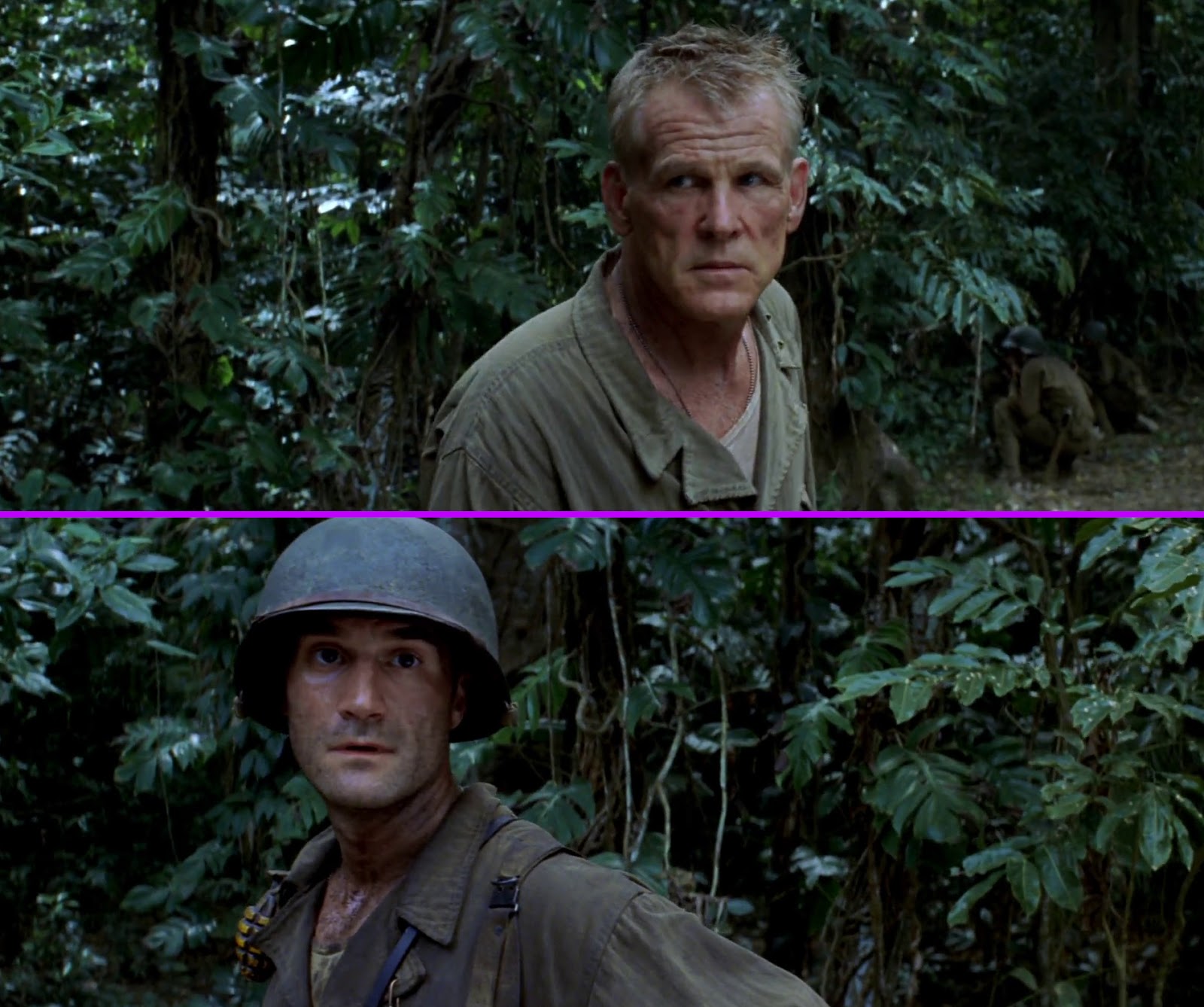
Tall, when speaking to Staros after the battle, compliments him for his leadership, but comments that his own “innocence” will be the end of him. Tall isn’t a purely hateful figure – while he may not experience the conflict the same way Staros does, he still walks through piles of dead Americans and Japanese, looking at them with pity and sorrow. To Staros, Tall may represent an emotionless tyrant who seeks nothing but victory, but in his own moments of reflection, Tall has remorse for the bloodletting he sends his men into. It is just that he projects a personality of indifference and harshness to push his men further to victory.
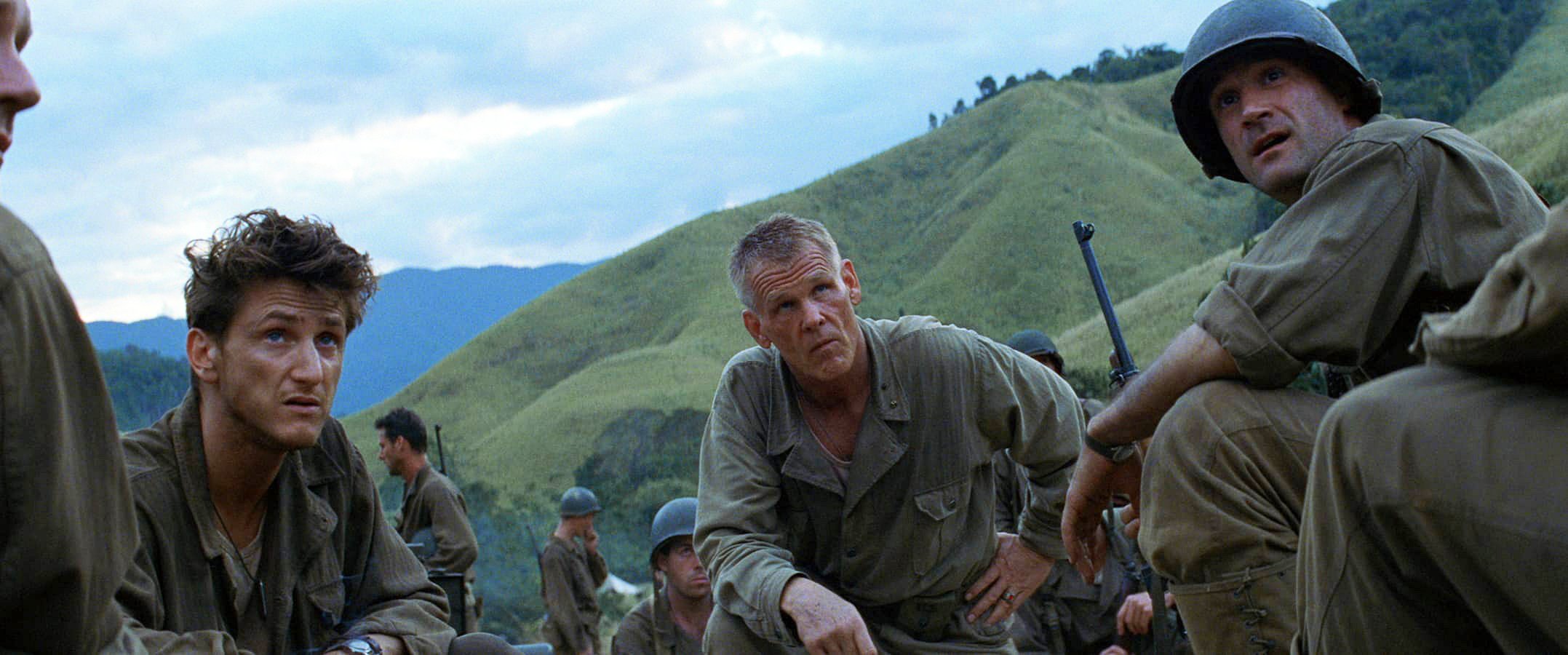
Captain Staros’ empathy for his men ultimately becomes his undoing. His reluctance to engage in battle forces Tall to relieve him of command, who calls him “soft, too softhearted for this world.” Staros rebukes him by stating “I just don’t like to see my men get killed. Tell me, Colonel, have you ever had a man die in your arms?”
Tall goes quiet, and reflects for a few moments, before muttering “Look at this jungle, look at those vines strangling the tree killing everything. Nature is cruel Staros!” Although Tall too understands the trauma war can inflict, his myopic focus on military victory forces him to accept the horrors that the dead and dying endure.
Tall shifts from a condescending tone to a reassuring one, telling Staros “I don’t see why we need to make a scandal out of this… you will get your medals and a safe job in Washington,” illustrating the duality of Tall’s perception towards his junior officer. Tall respects Staros’ integrity, but simply believes he is too pure for the world he finds himself in.
![The Thin Red Line (1998) - 'Light' scene [1080] - YouTube](https://i.ytimg.com/vi/LStF6yctrss/hqdefault.jpg)
Part 3: Seeing the Other Side
Throughout The Thin Red Line, Malick makes a clear attempt to have the audience become familiar with our character’s adversaries. Many film shots are taken from the Japanese perspective. Whether from Japanese soldiers shooting at Americans or in bunkers housing Japanese soldiers preparing for battle, the battles are rarely ever seen from primarily an American point of view.
Japanese casualties – the dead and wounded lying along the Pacific jungle – are given particular attention, with shots of American soldiers gawking or interacting with their enemy. The Japanese prisoners wear ragged uniforms, look half-starved, and stoically stare at their American captors, and I can’t help but feel pity for them. Like the Americans, they underwent hell throughout their time in the jungle, and likely had the same internal conflicts.
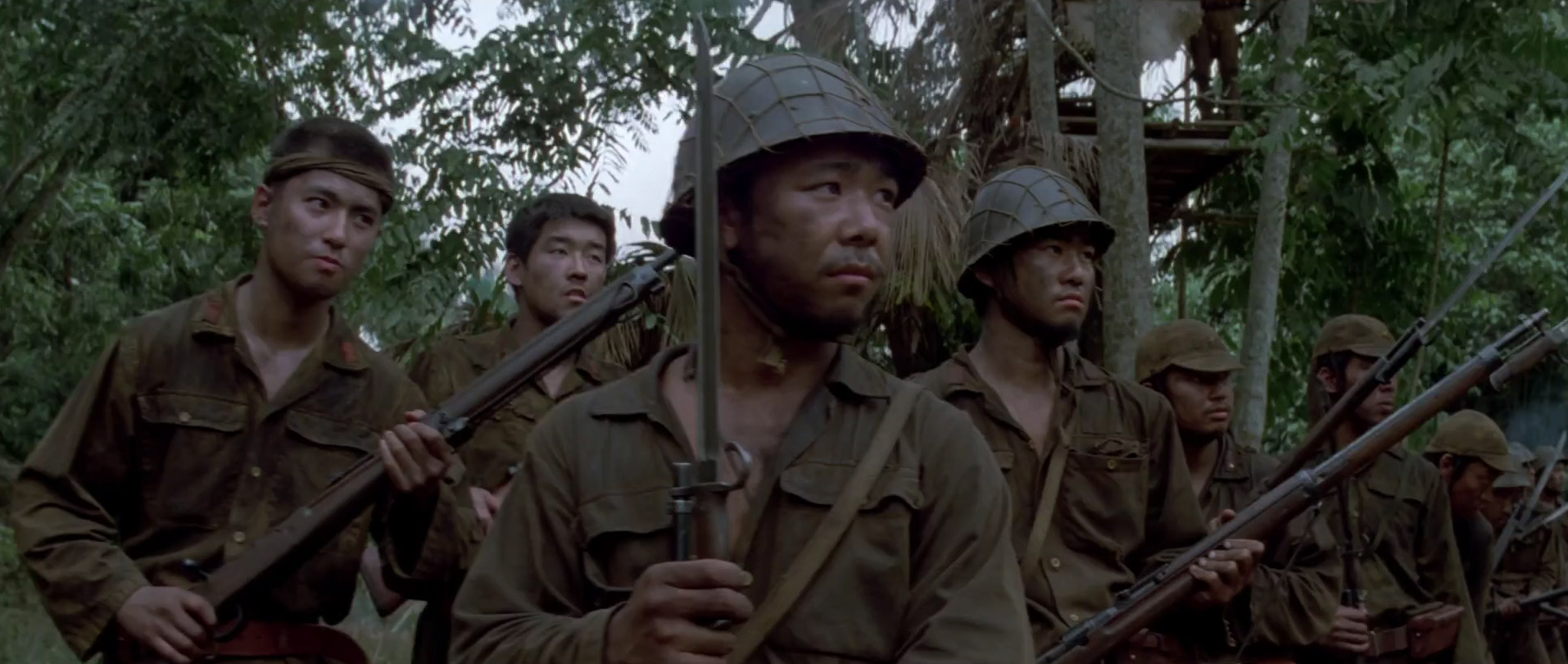
But the violence Malick shows in his film still remains as cold as ever. Witt and Welsh – fighting the enemy head-on whilst Colonel Tall and Captain Staros bicker in the rear – experience combat with calm, even as the battle scenes appear too fast to process. In one scene, running shots of American soldiers storming Japanese positions and scenes of Japanese soldiers running out of hiding spots and secret bunkers keep the audience on edge, but our characters execute their mission with brutal efficiency. It’s only after the battle ends, that the two men’s differences reappear.
Welsh physically distances himself from the graveyard he himself created, while Witt often spends time looking at the living and dead enemy. While gazing at the corpse of a Japanese soldier, a voice calls out to Witt, asking him “are you loved and treasured by all? Know that I was too,” representing Witt’s realization that those he killed were just as human as he.

It merely adds to Witt and Staros’ own anguish at the war they find themselves facing, with an enemy that to them is merely as conflicted about the conflict as they are.
Part 4: How to Embrace Death
Whilst on the peaceful beach, Witt recollects on his mother’s death, a woman “who went at last with a great peace and calm.” Realizing the potential for returning to combat, Witt wonders if he can too meet death with acceptance. Sergeant Welsh never directly discusses the risk of death in combat, likely because he has completely embraced it as inevitable given the hellscape he finds himself in.
It should be mentioned this is where I think the title of the movie comes into fruition – the name harkens back to an old Midwestern saying that “There is only a thin red line between the sane and the mad,” and how each character responds to the horrors before them divides them into these two camps.

In the first battle scene of the movie, the American soldiers find themselves suffering their first casualties. When a senior sergeant by the name of Keck is mortally wounded by a hand grenade, many of the young soldiers panic at the mutilated body of their leader. But Witt and Welsh render aid regardless, with the former comforting the panicked sergeant with the following words: “It’s gonna be alright, you didn’t let nobody down.”
Keck, comforted by these words, slips away into the darkness, but not everyone’s experiences with death come in the same way. A particularly young soldier, upon being shot in the chest, dies in tears and agony in the arms of Captain Staros. When Sergeant Welsh attempts to render aid to a badly wounded soldier (played by Kirk Acevedo), the latter merely asks for copious doses of morphine to put him out of his misery. Welsh ascents to this request and allows the man to die, although he is visibly distressed by the incident.
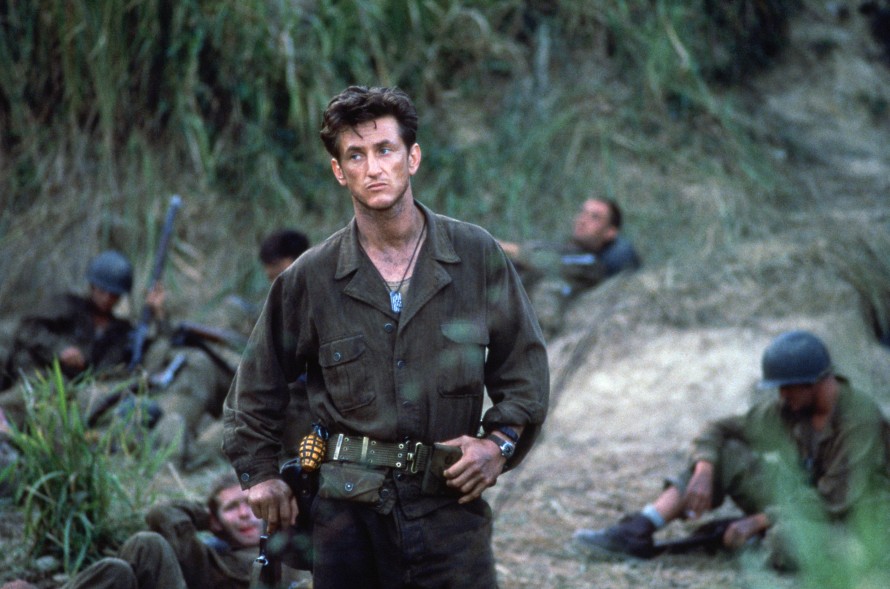
Other soldiers don’t die, but simply lose their minds amidst the carnage. When a senior officer, who had previously prayed with his men, sees their mutilated corpses on the hilltop, he enters into a hysterical state. “I gave them good orders, I told them to give it a push, but now I can’t see them no more” he stammers as he is evacuated.
Witt stands as a witness to all these morbid scenes, and as the film progresses he undoubtedly comes back to the memories of his mother’s passing and hopes that he can retain his own sanity.
Concluding Thoughts
The final 15 minutes of The Thin Red Line wrap up the interconnected storylines and character arcs into a somber ending answering many of the questions outlined above. Captain Staros’ removal from command left the company in the stead of an inexperienced young lieutenant, who while possessing a kind heart towards his men, lacks Staros’ convictions in standing up to Colonel Tall. Our protagonists find themselves marching through a stream, exposed by steep river banks on both sides, and with no idea where the enemy could be.
The replacement officer asks for volunteers to scout ahead, and Witt answers the call but discovers Japanese soldiers who are about to lay an ambush against the Americans. Witt boldly attacks the Japanese, then flees into the jungle to lure them away from the river. While running through the brush and into a clearing, Witt finds himself totally surrounded by Japanese soldiers.
Witt gazes in disbelief and then realizes that his time is up, with a soft Melanesian choir singing in the background, a callback to his earlier days in the village. While he at first looks around in fear, possibly looking for an escape, he then settles his gaze and almost smiles. Despite the pleas by a Japanese soldier to surrender, Witt raises his weapon and is killed instantly. We are taken back to the dream of Witt playing in the water with the Melanesian villagers, and we know that Witt found his idyllic dream. Like his mother, Witt found peace in death by realizing he could finally escape from the hellish landscape he found himself in.
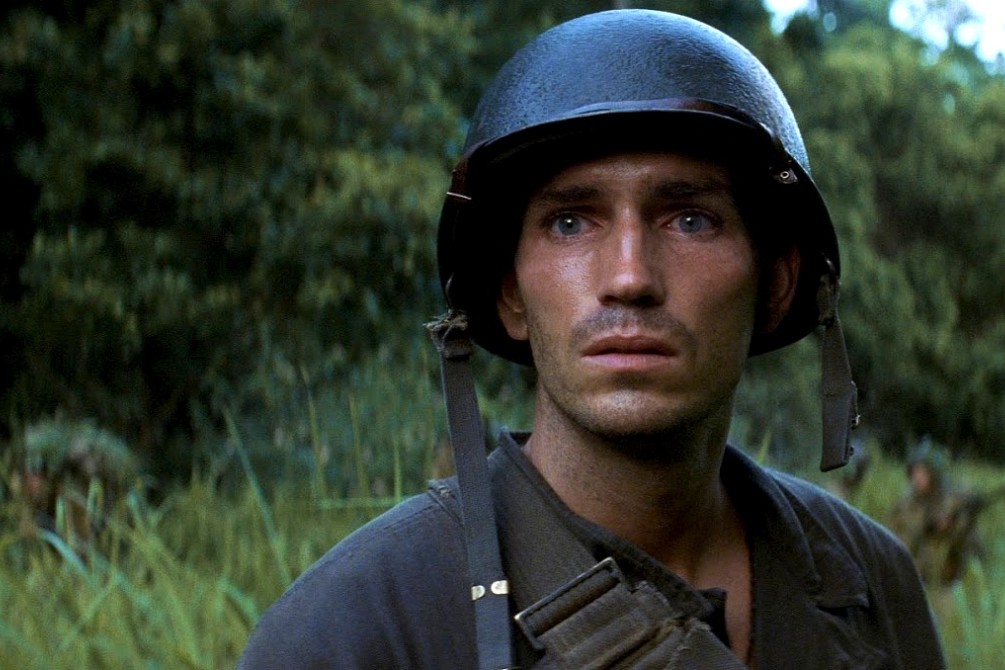
It should be mentioned that Witt’s idealism and virtues led to his downfall. Whereas Welsh spoke of “keeping your head down and staying alive,” Witt’s love for his fellow men drove him to sacrifice himself for the greater good. Shortly before his death, Welsh had told Witt “I feel sorry for you kid. This army’s going to kill you, you’re smart and you take care of yourself and you shouldn’t do anything else. You’re just running into a burning hell that no one can be saved. What difference do you think you can make in all this madness? If you die, this will all be for nothing.”
Ironically, Witt’s own self-sacrifice proved Welsh wrong. His idealism and hope for a better future had taken him to a better world, one where he could finally find his inner peace. For himself and for his brothers, Witt’s sacrifice was truly noble and meaningful.

After Witt’s death, Welsh and other Americans mourn his loss. With Welsh finally showing respect for his companion. Interestingly, Malick shows a light shining upon Welsh’s head, implying that Witt’s own optimism has lived on, through Welsh’s own memories of him. The final scene of the movie shows a tree sapling growing out of the beach, a sign of life’s own vigor and growth despite the surrounding chaos.
The Thin Red Line, by virtue of its philosophical undertones, is a complicated movie to review. The stellar cinematography, engaging battle scenes, and brilliant acting make it – at surface value – a solid war film, but the underlying messages make it so much more enjoyable. As someone whose great-grandfather fought at Guadalcanal as a staff sergeant, I often wonder how my forebear perceived the war. Did he reflect on the possibility of death or injury? How did he view his responsibility as a leader to the men in his squad?
But The Thin Red Line also posits questions to us, on too many questions to count.
Should we embrace our present fallen world as Welsh did? Could we see the world beyond our present state of sin? Should we embrace the aggressive but ruthless leadership of Tall or the loving yet indecisive nature of Captain Staros? And, when our time comes to leave this rock, could we go with the same peace and comfort that Witt felt, as he stood in that clearing of jungle?



